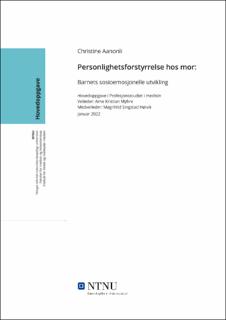Personlighetsforstyrrelse hos mor: Barnets sosioemosjonelle utvikling
Abstract
Bakgrunn: Lite forskning er gjort på hvordan symptomer på cluster C personlighetsforstyrrelse hos mor påvirker barnets sosioemosjonelle utvikling. I denne studien har vi sett på i hvilken grad disse symptomene er assosiert med en uheldig utvikling hos barnet. Metode: Mødre og deres 1-20 måneder gamle barn (n=) ble rekruttert på bakgrunn av selvrapportert eller observerte samspillsproblemer. Mødrene fylte ut DSM-IV og ICD-10 Personality Questionaire (DIP-Q), som måler symptomer på 10 ulike personlighetsforstyrrelser, og Ages and Stages Questionaires: Social and Emotional (ASQ:SE), som brukes for å kartlegge risiko for sosiale og emosjonelle vansker hos sped- og småbarn. Resultater: Analyser som ble gjort viste en svak positiv korrelasjon mellom barnets sosioemosjonelle utvikling og symptomer på cluster C personlighetsforstyrrelse hos mor. Standard multippel regresjonsanalyse viste at 3,1% av variansen i ASQ:SE-skår kunne forklares av tvangspreget-, avhengig- og unnvikende personlighetsforstyrrelse. Ingen av resultatene var signifikante. Konklusjon: Basert på våre analyser, er det ingen signifikant assosiasjon mellom symptomer på cluster C-personlighetsforstyrrelse hos mor og barnets sosioemosjonelle utvikling. Background: There has been little research done on how symptoms of maternal cluster C personality disorders affects the child´s socioemotional development. This study has looked at to which degree these symptoms are associated with a negative development in the child. Method: Included in the study were mothers and their 1–20-month-old children (n=79) due to self-reported or observed challenging mother-child interaction. The mothers filled out DSM-IV and ICD-10 Personality Questionnaires (DIP-Q), which are used to evaluate symptoms related to ten different personality disorders, and Ages and Stages Questionnaires: Social and Emotional (ASQ:SE), which are used to evaluate the risk of social and emotional difficulties in infants and young children. Results: The results of the analysis that was performed in this study showed a weak positive correlation between the child’s socioemotional development and symptoms of maternal cluster C personality disorder. Standard multiple regression analysis showed that 3,1% of the variance in ASQ:SE could be explained by obsessive-compulsive-, dependent-, and avoidant personality disorder. None of the results showed to be significant. Conclusion: Our analysis did not find any significant association between symptoms of maternal cluster C-personality disorder and the socioemotional development of the child.
